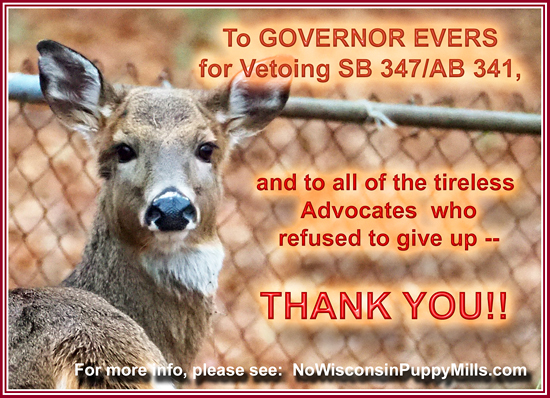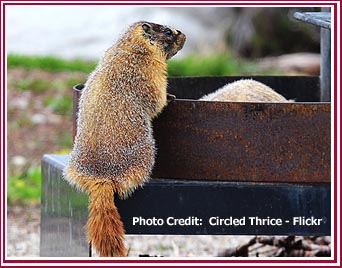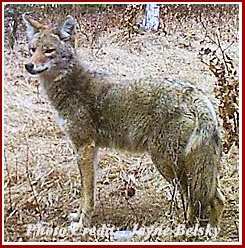|
|
|
|
|
|
ALERT UPDATE, 4/15/22: GOV. EVERS
JUST VETOED SB 347/AB 341, WHICH WOULD HAVE REMOVED STATE OVERSIGHT FOR CAPTIVE
WILDLIFE EXHIBITORS WHO ARE LICENSED BY THE USDA!
Updated 4/15/22
|
|
|
|
| |

GREAT
NEWS: WI Wildlife Advocates, YOU DID IT! Today, April 15, 2022, Governor Evers
VETOED SB 347, relating to: captive wildlife in facilities holding a
U.S. Department of Agriculture exhibitor license!
Would you
please take a moment to THANK Gov. Evers through the
Voice An Opinion form on his website:
(https://appengine.egov.com/apps/wi/governor/voice-an-opinion) or call him at
608-266-1212?
In his veto
memo, Gov. Evers says, "I am vetoing this bill in its entirety because I
object to reducing the standards to which wildlife exhibition facilities are
held in Wisconsin. . . . Eliminating the state licensing requirements from
these facilities would prevent the [WI DNR] from applying state standards that
are designed to ensure humane handling, care, treatment, and transportation of
captive animals." (Read entire Veto Message here.)
THANK
YOU, each and every one of you who contacted the Governor yourselves
and asked others to do the same!
Please
see below for information about the bill itself, including description, links
to bill language, bill summary, and Talking Points.
|
|
| |
|
 Bill Text Bill Text  Bill History Bill History  Bill
Summary Bill
Summary 
 TAKE
ACTION TAKE
ACTION  Talking
Points Talking
Points 
 Find your WI State
Representatives Find your WI State
Representatives  What To Expect At A Public Hearing What To Expect At A Public Hearing 
|
| |
|
 In the wake of the TV series
"Tiger King," which graphically exposed conditions and abuses at a
private wildlife exhibition, most of the country is looking at regulations to
tighten state control over private ownership of captive wildlife. Instead, SB
347/ AB 341 would seek to LOOSEN such control in a state that already
lags behind most of the US in regulation of private ownership of captive wild
animals and roadside zoos! In the wake of the TV series
"Tiger King," which graphically exposed conditions and abuses at a
private wildlife exhibition, most of the country is looking at regulations to
tighten state control over private ownership of captive wildlife. Instead, SB
347/ AB 341 would seek to LOOSEN such control in a state that already
lags behind most of the US in regulation of private ownership of captive wild
animals and roadside zoos!
SB
347, relating to: captive wildlife in facilities holding a U.S. Department of
Agriculture exhibitor license, was introduced on May 14, 2021 by Senators
Wanggaard, Nass and Felzkowski; and cosponsored by Representatives Dallman,
Murphy, Moses, Knodl, Swearingen and Rozar. Representative Schraa was added as
a cosponsor on 7/15/11, and Representative Born was added as a coauthor on
2/22/22. The bill would exempt facilities that hold a
U.S. Department of Agriculture (USDA) Class C exhibitor license from Wisconsin
state licensing. It was assigned to the
Senate Committee on Insurance, Licensing and Forestry. A
public hearing was held on May 26, 2021, and the bill was passed out of
Committee, by a vote along party lines, on June 3. On Wednesday, June 9, it was
passed in the full Senate by a vote of 19 Ayes (all Republicans) and 13 Noes
(12 Democrats and one brave Republican who chose to vote his conscience and
thus made the opposition to the bill bipartisan).
On May
21, 2021, a companion bill, AB 341, was introduced. It was referred to the
Assembly Committee on Agriculture. A public hearing was
scheduled for Wednesday, October 6, 2021, at 10:00 AM, but cancelled at the
last minute, reportedly because Matt Schoebel, who has been strongly lobbying
for passage of the bill, was unable to attend. Another public hearing was not
scheduled.
When
no further action was taken by The Assembly Committee on Agriculture after the
first public hearing was cancelled at the last minute, the bill was withdrawn
from that committee on 11/30/2021, and referred to the
Assembly Committee on State Affairs (Chaired by Rep.
Swearingen, one of the bill co-signers) pursuant to
Assembly Rule 42 (3)(c). A public hearing was held on
1/5/22, with a scant 24-hour notice, and in the middle of a winter weather
advisory. Nevertheless, several animal welfare advocates braved dangerous
driving conditions to show up to register and/or speak in opposition to the
bills, and we thank them! It wasn't pretty -- there were more of
"Them" than there were of "Us," and at an Executive Session
on Jan. 23rd, the bill was passed out of commitee along party lines, with 8
Ayes and 4 Noes. The bill was then moved to the Committee on Rules on the 1st
of February; then, made a special order of business in the full Assembly floor
session on 2/23022 pursuant to Assembly Resolution 29. It was tabled by the
full Assembly, which then passed the Senate version, SB 347, by voice vote.
Governor Evers VETOED the bill on April 15,
2022!!!!
 Assembly Comm. on State Affairs Record of Committee
Proceedings Assembly Comm. on State Affairs Record of Committee
Proceedings 
 Assembly Comm. on State Affaris Hearing Testimony &
Documents Assembly Comm. on State Affaris Hearing Testimony &
Documents 
According to the
USDA/ APHIS website, the Animal Welfare Act mandates that,
"Individuals or businesses with warm-blooded animals that are on display,
perform for the public, or are used in educational presentations must be
licensed as exhibitors with APHIS. Licensed exhibitors include circuses, zoos,
educational displays, petting farms/zoos, animal acts, wildlife parks, marine
mammal parks, and some sanctuaries. The animals involved in the exhibition may
include domestic and exotic animal species."
Under
current WI law, known as the captive wildlife law, the
Department of Natural Resources (DNR) regulates the
possession of, and other activities related to, certain wild animals. Generally
under current law, a person may not possess a wild
animal that is native to Wisconsin without a license from DNR. There
are exceptions to this prohibition for some animals, including chipmunks, mice,
pigeons, and voles. Certain entities may possess wild animals without a license
from DNR, including veterinarians, zoos accredited by the Association of Zoos
and Aquariums, municipal zoos, and circuses.
Also,
"All farm-raised deer keepers are required to be licensed and registered
by the
Department of Agriculture, Trade, and Consumer
Protection."
According to the WI DNR, "A
wide variety of entities may meet the threshold for licensing, including
agribusinesses, amusement parks, animal shelters, breeders, camps/ resorts,
educational institutions, nature/ educational centers, rescues/ rehabilitators,
production companies, parks, petting zoos, retail, and sanctuaries."
Depending on species, the
standards set by the WI agencies much exceed those set by the Animal Welfare
Act.
On
6/23/21, Wisconsin humane and natural resource protection organizations
unsuccessfully called upon the authors of SB 347 / AB 341 to immediately
WITHDRAW the bill (which would remove state oversight for some captive wildlife
owners/exhibitors). One of the major organizations for whom this legislation
was drafted has been found to have illegally imported a non-native invasive
species into Wisconsin; these animals are now loose on AND off the owner’s
property! For details, see:
Up to 20 non-native prairie dogs loose at Wisconsin's Shamba
Safari
We at
Wisconsin Puppy Mill Project are very much OPPOSED to SB 347/AB 341. In fact, we would like
to see state licensing requirements for private owners of captive wild animals
strengthened. We know from experience that the USDA licensing requirements and
standards are outdated, minimal at best, and often inadequately enforced. We
are also opposed to laws such as this that would take the stewardship of WI
animals out of the hands of experts in our own
state.
|
| |
Top
|
| |
Bill Summary (by the
Legislative Reference Bureau):
 "This bill exempts a facility
that holds a U.S. Department of Agriculture exhibitor [Class C] license from
state license requirements relating to captive wild animals. "This bill exempts a facility
that holds a U.S. Department of Agriculture exhibitor [Class C] license from
state license requirements relating to captive wild animals.
"Current law generally
prohibits the possession, exhibition, propagation, sale, and purchase of wild
animals without a relevant license issued by the Department of Natural
Resources. Public zoos and aquariums, which are facilities operated by the
state or by a city, village, or county or that are an accredited member of the
American Zoo and Aquarium Association, are exempt from these license
requirements.
"The bill also exempts from
the license requirements a private facility that holds a valid Class C
exhibitor license issued by the USDA. This license is required under the
federal Animal Welfare Act for any individual or business engaged in public
exhibition of animals covered by the act. "
|
| |
Top
|
| |
WHAT YOU CAN DO:
General guidelines for
contacting your representatives: Try to keep your message brief, and be sure to
give your name, address, and phone number. Please, ALWAYS be polite and
respectful. Name-calling, and rude or abusive letters or emails will hurt,
rather than help, our cause.
GREAT
NEWS: WI Wildlife Advocates, YOU DID IT! on April 15, 2022, Governor Evers
VETOED SB 347, relating to: captive wildlife in facilities holding a
U.S. Department of Agriculture exhibitor license!
Would you
please take a moment to THANK Gov. Evers through the
Voice An Opinion form on his website:
(https://appengine.egov.com/apps/wi/governor/voice-an-opinion) or call him at
608-266-1212?
 Find your WI State
Representatives Find your WI State
Representatives 
|
| |
Top
|
| |
Talking
Points:
 Quite simply, responsibility for captive native WI wildlife SHOULD
lie with the WI agencies most familiar with dealing with these animals. We are
opposed to laws that would take the stewardship of WI animals out of the hands of experts in our own state. Quite simply, responsibility for captive native WI wildlife SHOULD
lie with the WI agencies most familiar with dealing with these animals. We are
opposed to laws that would take the stewardship of WI animals out of the hands of experts in our own state.
At a time when many states are passing laws
to strengthen their regulation of captive wildlife and roadside zoos, this bill
is a giant step BACKWARD for Wisconsin!
This bill was rushed through without proper
vetting or consideration. Sponsors did not consult with state animal advocacy
organizations, nor the the five AZA accredited organizations in WI.
Currently, a Captive Wildlife Animal Farm
License (CWAFL) is required for activity involving most native species, and
some non-native species, of captive wild animals including: species designated
as harmful wild animals (all bears, cougars, wolf-dog hybrids, mute swans),
endangered or threatened species, and most migratory game birds. Removing state
licensing requirements would:
remove higher
standards set by the DNR Captive Wildlife License; requiring exhibitors to
adhere only to the very minimal standards of the federal Animal Welfare Act,
which is enforced by the same agency that oversees the nation's puppy mills.
The USDA only has 109 inspectors to oversee 10,000 plus facilities in the
United States.
remove state pen requirements tied to the
CWAFL for cougar, bobcat, lynx, wolves, wolf-dog hybrids, coyote, fox, fisher,
eagles, hawks, falcons, owls racoons, badgers, beavers, otters on exhibit.
Removal of state licensing and oversight
would be detrimental to the animals and possibly to public safety:
Current licensing
through the WI DNR ensures that USDA Class C licensees are held to standards of
care which, depending on species, greatly exceed those of the Animal Welfare
Act (AWA).
Concerns related to animal health and care
and public safety would no longer be reported to the DNR for immediate
investigation, but would have to be submitted to the USDA, which may not be
able to respond in a timely manner.
The DNR would no longer be able to
confiscate animals from situations where they were in danger or presented a
danger to the public, or from facilities that were violating the law.
The DNR would no longer be responsible for
helping recapture escaped animals. Instead, this would be left up to local
authorities, who may not be equipped to handle them.
Escaped captive wild animals recovered by
local authorities may end up being held in local animal shelters, which may not
be equipped to cope with them.
The Office of the
Inspector General has criticized the USDA for poor enforcement of the AWA,
including failing to recognize safety- related violations. (See:
Follow-Up to Animal and Plant Health Inspection Service's
Controls Over Licensing of Animal Exhibitors)
Generally under
current law, a person may not possess a wild animal that is native to Wisconsin
without a license from DNR. There are exceptions to this prohibition for some
animals, including chipmunks, mice, pigeons, and voles. Certain entities may
possess wild animals without a license from DNR, including veterinarians, zoos
accredited by the Association of Zoos and Aquariums, municipal zoos, and
circuses.
Zoos accredited by the Association of Zoos and Aquariums are
exempt from current state licensing due to the intense standards of care and
safety requirements required by the AZA. Per the AZA, fewer than 10% of
the approximately 2,800 animal exhibitors licensed by the USDA are AZA
accredited.
Facilities in favor of this legislation
give "additional paperwork with state licensing" as the reason for
their support. This "additional paperwork" includes record- keeping
details of how many animals of what types they have, as well as where they are
kept and how they are treated. This level of accountability would be lost if SB
347 becomes law.
Reportedly, the driving force behind the
bill is Animal Entertainments, owned by Matt Schoebel, and is the parent
company for Timbavati Wildlife Park in Wisconsin Dells, WI; Shamba Safari in
Neshkoro, WI; and for Wildlife Limited, a traveling petting zoo that also hosts
pig races, pony rides and camel rides.
Wisconsin's
Animal Entertainments cited for Illinois zebra escape incident.
From Public Hearing testimony by
Lindsey Long, Wildlife Veteranarian for the WI DNR: Federal standards
for licensing and regulation of a ClassC Exhibitors License regarding methods
of acquisition/ disposition, humane animal care/ housing, human safety, and
record keeping do not always align with state law and requirements, and
in some cases may be more lenient. For these licensees, requiring both a
federal and state license is complementary, with state regulation enhancing the
protection, care, and safety of both the animals and the public.
Creating a license exemption for Class C
Exhibitors would prevent the application of state standards designed to ensure
humane handling, care, and transportation of captive wild animals. This could
result in less stringent treatment of a class of captive wild animals that has
a potential to be significant in reach.
Without consistent standards, there may be
increased potentioal for disease transmission between captive wild animals and
domestic and free-roaming wild populations due to escapes and inadequate
separation.
Certain species, if escaped, have high
potential to cause damage, and present public safety concerns.
Concerns related to animal health and care
and public safety would no longer be reported to the DNR for investigation, but
to the USDA, which may not be able to respond in a timely manner.
Class C exhibitors would be exempt from
record- keeping requirements, and the DNR's ability to “assume title on
behalf of the state" of any captive wild anmal possessed in violation of
the captive wild animal laws might be prevented or entirely removed.
In June, Wisconsin
humane and natural resource protection organizations called upon the authors of
SB 347 / AB 341 to immediately WITHDRAW the bill . One of the major
organizations for whom this legislation was drafted has been found to have
illegally imported a non-native invasive species into Wisconsin; these animals
are now loose on AND off the owner’s property! For details, see:
Up to 20 non-native prairie dogs loose at Wisconsin's Shamba
Safari
-
Corrected Fiscal Estimate, AB 341/SB 347
Committee on Insurance, Licensing and Forestry Record of
Committee Proceedings
Senate Committee on Insurance, Licensing and Forestry Public
Hearing Testimony and Documents
Assembly Comm. on State Affairs Record of Committee
Proceedings
Assembly Comm. on State Affaris Hearing Testimony &
Documents
List of Active Licensees and Registrants Under the USDA Animal
Welfare Act

 Bill Text Bill Text  Bill History Bill History  Bill
Summary Bill
Summary 
 TAKE
ACTION TAKE
ACTION  Talking
Points Talking
Points 
 Find your WI State
Representatives Find your WI State
Representatives 
 What To Expect At A Public Hearing What To Expect At A Public Hearing 
|
| |
Top
|
|
|
|
|
|
|
WPMP
Home * What Is A Puppy Mill?
What Can I Do About
It? * Laws/Legislation
|
|
|
|
|
©
Copyright, 2019. The Wisconsin Puppy MIll Project
P.O. Box 926 * Sheboygan, WI
53082-0926 * info@NoWisconsinPuppyMills.com
Photos Copyright © 2009,
F. Menish. All Rights Reserved. Used with permission.
Website design by
Hook & Web
Designs
|
|